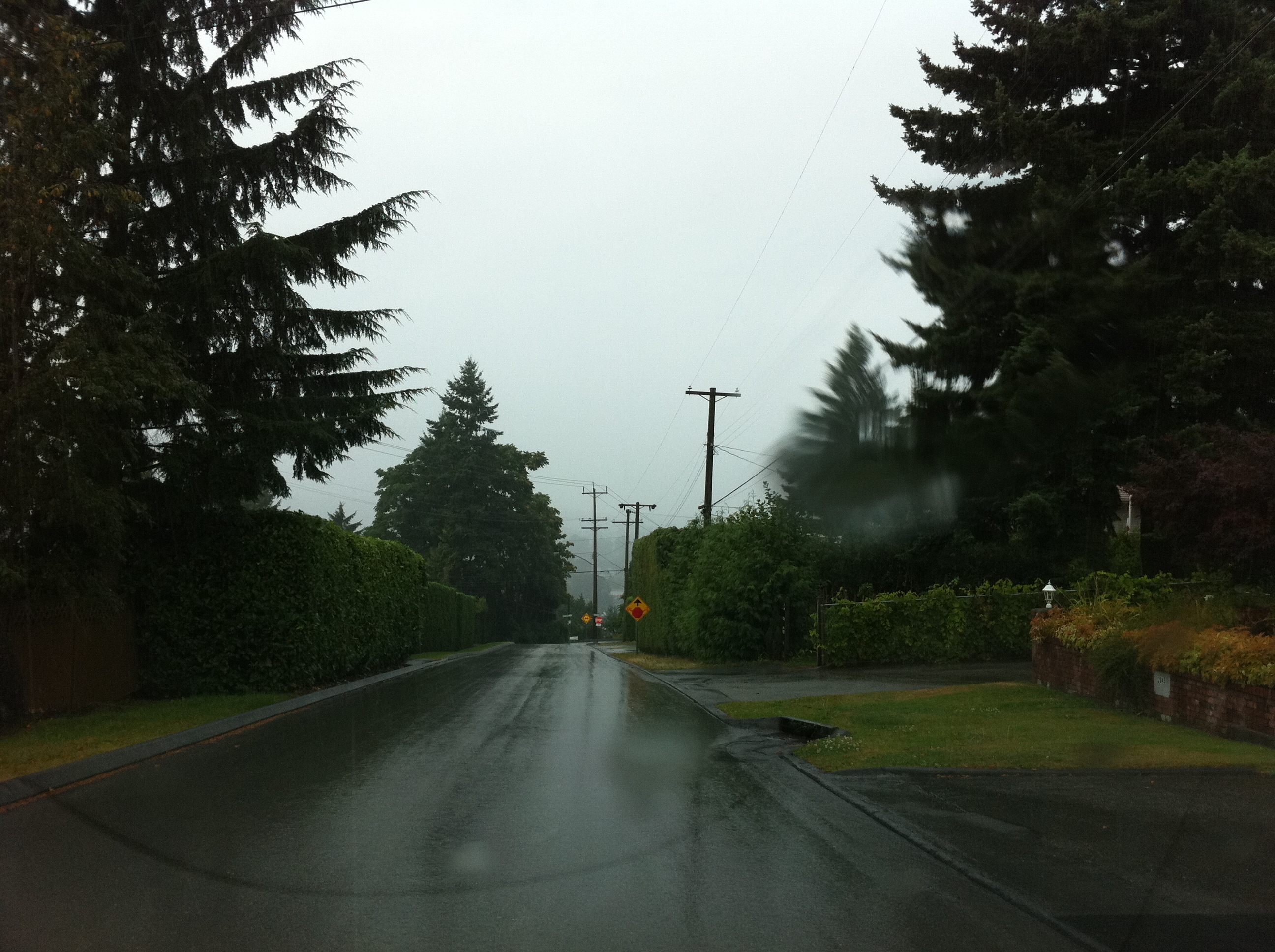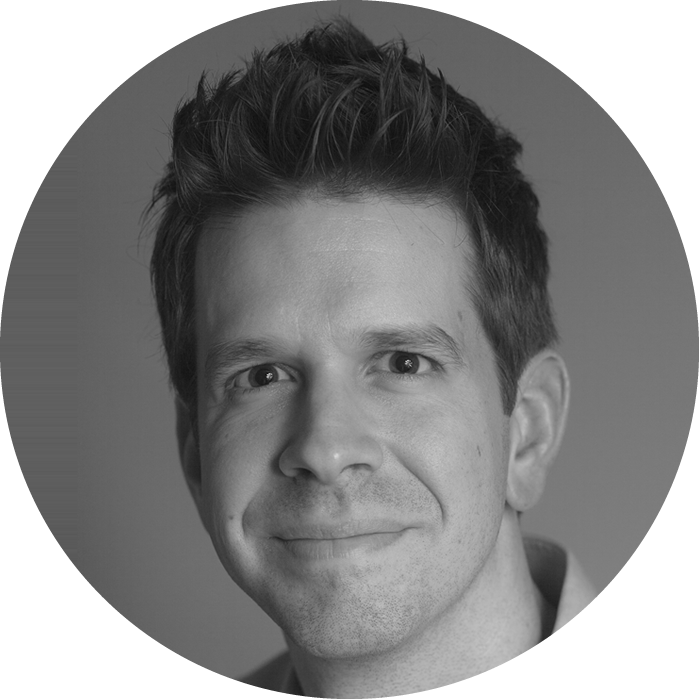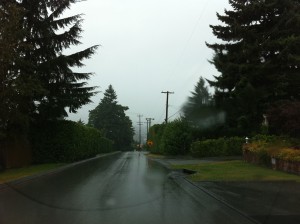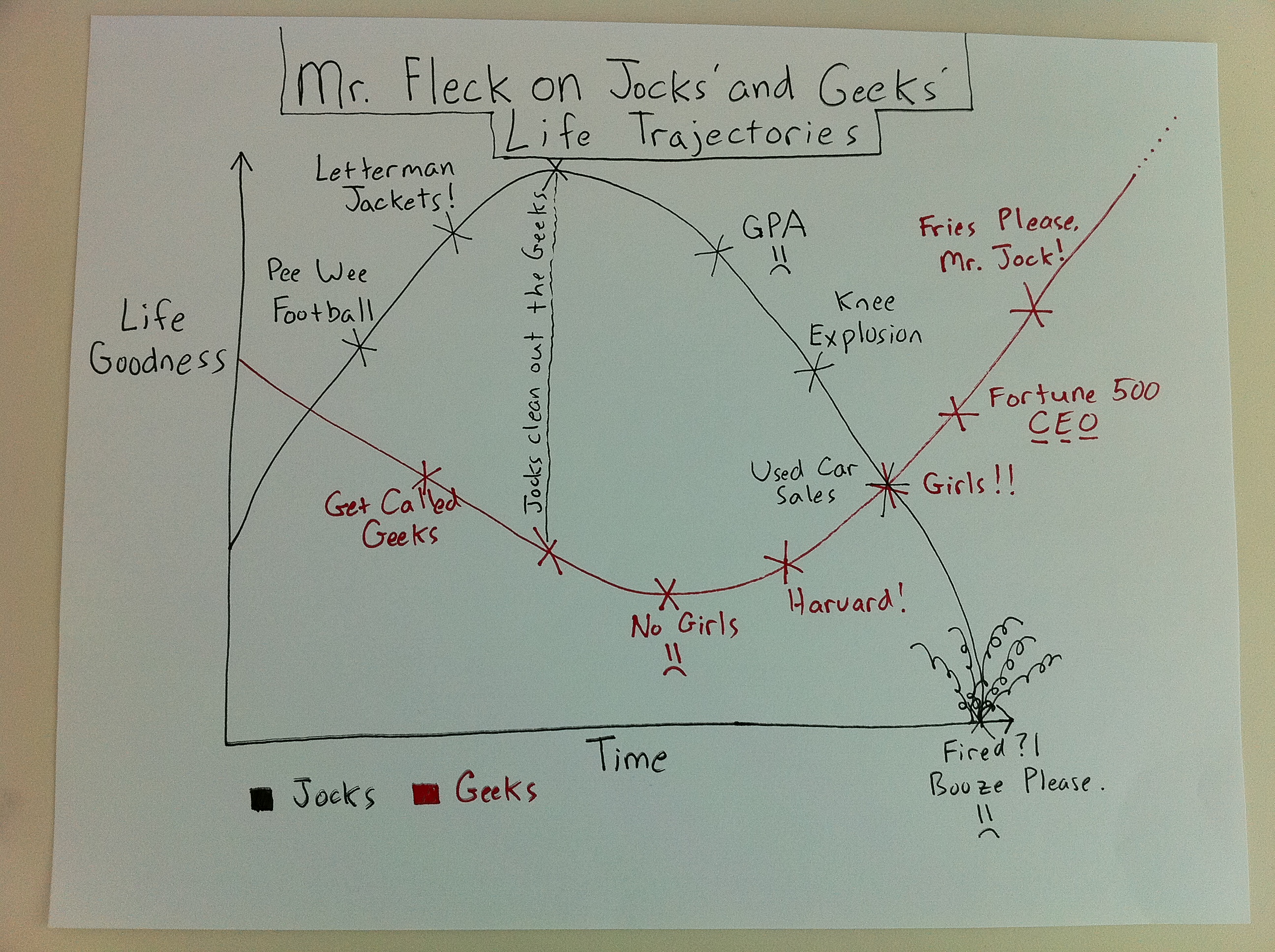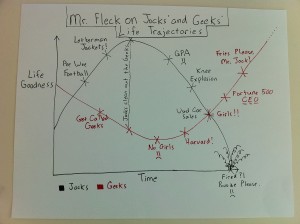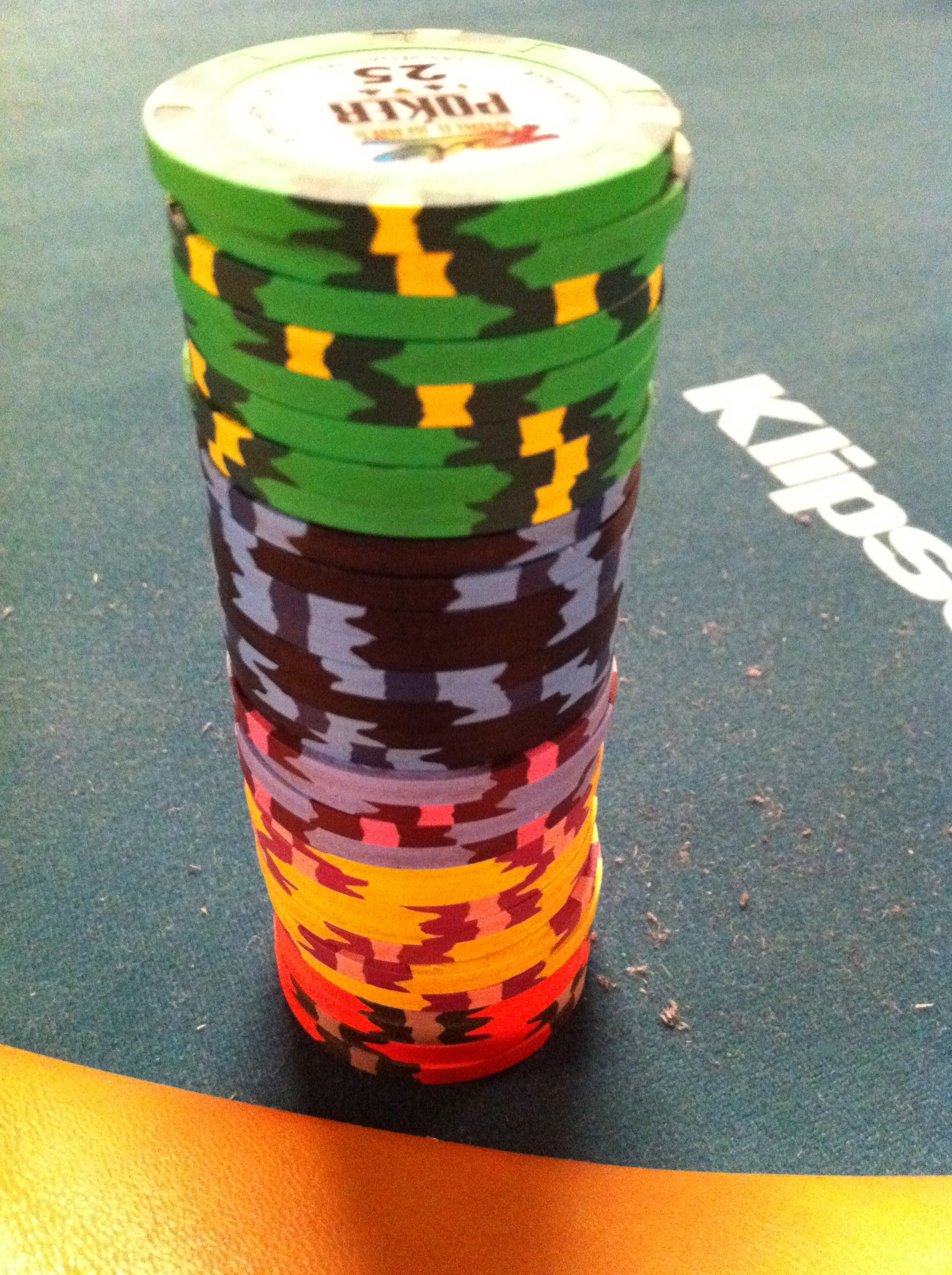
Day 12 (July 4): I did end up playing the Wynn re-buy yesterday, and min-cashed again. Here are my results for the trip so far:
- (+$231) Rio – $235 – 964 entrants – finished 79 – $466
- (-$625) Wynn – $625 ($225 plus two $200 rebuys) – 111 entrants, finished around 45 (15 paid)
- (-$1k) WSOP 43
- (+$560) Wynn – $425 ($225 plus one $200 rebuy) – 156 entrants, finished 20 – Ran T8o into QQ in the blinds
- (+$394) Wynn – $425 ($225 plus one $200 rebuy) – 128 entrants, finished 15 – Ran 82o into AKo in the blinds
- (+$752) Wynn – $425 ($225 plus one $200 rebuy) – 131 entrants, finished 11 – Lost flip w/ 99 < AKo
- (-$425) Wynn – $425 ($225 plus one $200 rebuy) – 125 entrants, finished 21 (15 paid) – Lost flip with 66 < AQs
- (+$666) Wynn – $425 ($225 plus one $200 rebuy) – 139 entrants, finished 15 (16 paid) – Ran 84s into KJo
A few thoughts on these results:
- Overall, I’ve cashed 5/8 tournaments for the trip. Over the long run, 2/8 would be considered “good”, and 5/8 is pretty sick. I’m obviously sort of on a heater.
- But what these numbers don’t show is that I’ve actually be running bad and not catching cards. The last non-cash at the Wynn (finished 21 when 15 paid), I lost a very big pot with about 40 people left: I had QQ and lost a three-way all-in to TT and 66 (66 won the main pot and I chopped the side pot with TT). Had I won that pot, I would’ve had good chips approaching the money and could have gone to work building my stack. Instead, I was crippled and ended up bubbling in 21st when I lost a coinflip.
- For my last five tournaments, I’ve listed my bust out hands. I’m running bad in those spots. I got all-in totally dominated once, but otherwise got in on the better side of a coinflip twice, and lost two 60/40s. A big component of my style is that I am rarely all-in and called (at risk to bust from the tournament), so it’s not like I’ve been all-in 10 times before these hands come up. In some cases, this is the first time I’ve actually been at risk in the tournament. I will only lose all four of those hands about 7% of the time, and if I win any of those hands, I’ve doubled up and have a very good chance at making the final table.
- I’m playing the short stack very well right now. Most of the time I’m on a short stack (such is the nature of this tournament structure), and sometimes very short (like eight big blinds or fewer). Normally, I wouldn’t let my stack get this short, but I’m able to find so many spots to steal blinds and get all-in with the best hand that I’m being more patient than normal. In my last cash, I had under seven big blinds with 21 players left and managed to finish 15th without catching any real hands. Playing the short stack is like that scene in “Indiana Jones and The Last Crusade” where Indie has to walk across the stones that will fall out from under him. (I spent way too long trying to find a good screencapture of Indie stepping across the stones, but just couldn’t find it.) I have to step very carefully and pick each move very wisely or I’m out of the tournament. I’m doing this well right now.
Enough about poker. Today is the 4th of July, and that means… well, I’m not exactly sure what it means. Hopefully the annual party at Mandalay Bay is happening, but I really haven’t heard one way or the other on that. If it’s not happening, I might take my first shot at a $550 mega satellite at the Rio – I need to start trying to win a Main Event seat. It’s kind of a long shot, but the good news is the Wynn has been prepping me to play a super short stack, and that’s what winning megas is all about.
I’m heading over to do some book work with my co-author this afternoon. It’s great to be making real progress while I’m out here. We’re about to wrap up a major section that is the foundation for the entire book, so I’m looking forward to getting that done.
Day 13: Turns out the Mandalay Bay party didn’t happen this year. That was pretty disappointing because I always look forward to seeing old friends and having a nice view of the fireworks on The Strip. Of course, since Vegas sneakily moved fireworks to July 3rd this year, we wouldn’t have had anything to watch anyway.
Since there wasn’t a Mandalay Bay party, a bunch of us went to Mesa Grill at Caesar’s Palace instead. That’s one of my favorite restaurants in Vegas, so I was happy to finally have a meal there. I forgot to get a picture of the spread, but it was ridiculous and delicious.
This morning, I met with my co-author (@VanessaRousso) and her friend Annie (@AnnieDuke) for a few hours to talk about writing and poker. They even discussed a couple interesting hands that Vanessa has encountered at this year’s WSOP. It was really fun to sit and listen to two great poker minds work through hands. (I’m not intentionally name-dropping here, but since I already mentioned this meeting and its attendees by name on Twitter, I figure it would be awkward if I started talking anonymously all of a sudden.) Anyway, it was a very good meeting that clarified some of the unkown parts of the writing process for us.
After that meeting I tried to hoof it over to the Rio for the $1,500 WSOP event to late-register, but by the time I got there the tournament was already an hour in, and the line was too long to justify registering. So I went to the Wynn and started 30 minutes late there. I actually played pretty well, but didn’t cash (finished 32 and 13 paid). I busted making a pretty risky move, but I saw it as a good chance to pick up dead money, and it just didn’t work out. Sometimes there’s a good spot to make a move, but you run into pocket Kings.
I busted out, then went to dinner with Luckbox Larry and wife at a pretty nice Indian place called Mint. We hadn’t been there before, but we all liked it a lot and will probably go back. We’ll be more inclined to return if we can find more coupons, of course.
I ended up turning in early because I was feeling under the weather again. I think I actually got a cold or something this time, so I figured the best thing was to take it easy. I ended up sleeping for like nine hours, which is a long time for me.
Day 14: Today I was going to do my normal routine of waking up, going to Starbucks to read the news and catch up on writing. But after about 20 minutes Luckbox Larry texted me to let me know there was a 10:00 AM $550 Mega Satellite to the Main Event. I decided to go ahead and play that so I could get some poker in without making me miss the Rally to End Cancer kickoff party hosted by my friends Vanessa and Chad at MGM. Turns out I made it exactly one hour into the stupid thing when I ran QQ into AK and lost the coinflip.
I spent the middle of the day sleeping off my cold. Then went over to MGM for the kickoff party. It was a good time. Vanessa’s husband Chad was recently diagnosed with and underwent treatment for a very rare form of cancer, so they have a real stake in cancer research and they’re aggressively pursuing ways to further cancer research. It was cool to see people coming together to talk about raising money for cancer research, and I think the event they’re planning is going to be pretty neat.

(Note that pic was just before the party started – the place eventually filled up, but I forgot to snap a pic.)
Day 15: Today was pretty unfun. I decided to play the Wynn re-buy and busted out of that pretty early when I ran AJo into AA against a very aggressive player who 3-bet me from the button at a 6-handed table. With our stack sizes and respective images, this is the equivalent of a cold deck – he has Aces almost none of the time in that spot, and I’m often raising hands I can just fold there. But AJ was probably ahead of his range, and I could get him to fold some hands that had me slightly beat (77/88). Even the way he turned over his Aces basically said, “Yeah, I know. But I actually have them this time.”
Later on, I went to dinner with some friends. Luckbox Larry won a bet so that Dan had to buy him a $60 burger at a place at Mandalay Bay. So we went over there and had good burgers and shakes while Luckbox Larry ate his foie gras burger with shaved truffle. I understand that’s supposed to be an awesome burger, but the smell of truffles kind of grosses me out.
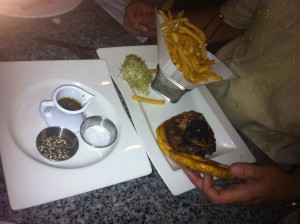
It looks like I’ll be playing the Main Event this year (the details are still not nailed down, but it seems likely), so I’m started to try to get mentally ready to play that event. The WSOP Main Event is totally unique in that it’s a very deep structure (you start with 30,000 chips at 50/100 levels, and the levels are two hours each) and there are thousands of entrants, most of whom really don’t know how to play poker. It’s basically the optimal structure for me as I’m very comfortable in slow, deep stacked tournaments. But I also need to get my head right because I’ve been running pretty bad, and I’ve been playing really, really fast tournaments since I got here.
Day 16: I took it easy today to try to get my head right for the Main Event. I think I’ll probably play, but I’m not entirely sure. There are still some things that need to fall into place for it to work out. I’d really like to play, but I won’t be devastated if I don’t get to play.
Anyway, I got a good workout in today, and spent the rest of the day reading and watching TV and stuff. Netflix on iPhone/iPad/MacBook is keeping me sane out here. I’ve watched most of “Dead Like Me” Season 1, and I’m almost finished with Cheers Season 2. Both are pretty good shows for very different reasons.
I’ve been reading Annie Duke’s book “Decide to Play Great Poker” (Amazon link below), and it’s pretty good so far. It’s a high-level book focusing on concepts and ways to think about the game rather than a step-by-step guide to playing poker. I’ve already seen a few ways to think about stuff differently, so that’s been helpful. I think one thing it does well is focus on high-level concepts – it stays out of the weeds of math and really technical discussions. So far, so good. (Jump to the bottom of the post for a link to the book on Amazon.)
I had In-N-Out again tonight. We went at like 9:00 PM, expecting the place to be mostly empty. It most definitely was not empty. I couldn’t believe how many people were getting burgers late at night. That place must be printing money.
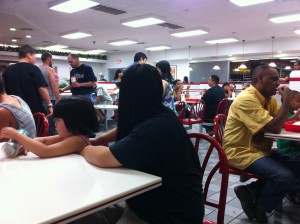
Zooming out a little bit, I realized I haven’t really described like my overall schedule out here. It’s actually pretty simple and repetitive. I think that’s actually kind of obvious in my recent posts, which are shorter and less detailed. I’m basically doing the same thing over and over again each day. Occasionally something will jump up and change the routine, but I’m more or less living a strange version of Groundhog Day.
I generally wake up between 8:00 and 9:00 AM, get ready for the day and head to Starbucks to catch up on reading and update the diary. I hang at Starbucks for a couple hours and then start trying to find some lunch around noon. Sometimes I just go back to the hotel room and make a PB&J, but I’ll also go meet friends for lunch or whatever. Then I try to figure out if I’m playing poker, writing or relaxing for the rest of the day. Most of the time, I’ve played poker, and I’ve probably had an even split of relaxing and writing for the rest of the time. If we’re writing, we usually break around dinner and then take it easy the rest of the evening. If I’m playing poker, I’m hoping to make the dinner break and then head to the final table (which hasn’t happened for me yet). Then it’s back to the hotel to read and watch Netflix. Then time to sleep and start over again.
It’s pretty unexciting except when I go to a new restaurant or have a meeting or something to break up the routine. Sometimes a friend will be making a deep run in a tournament, or a friend of a friend will be at a WSOP final table and I’ll head over to watch them play and provide support for a while. “Support” can just be hanging out, watching them play (it’s always encouraging to know some friends are keeping an eye on you when you’ve been playing for 10 hours and you’re starting to get tired). “Support” can also be doing reconnaissance around the bubble, and as they approach a final table.
On the money bubble, it’s helpful to know where the short stacks are and to get a sense of how long the bubble will last. When we’re playing online, we can just go look at the leader-board for that stuff. But it’s tougher to get that information when we’re playing live. So the person doing the recon might wander off, then stop by and say, “Two micro-stacks on that table over there. And on that other table, a stack shorter than yours will take the big blind in the next hand.” This information can help shape the correct strategy at that moment, so it’s very helpful. Occasionally, we’ll have a history with some of our friend’s opponents, or we’ll spot tells on people, and we can share that info.
Day 17: It’s 10:15 PM and I still don’t know if I’m playing the Main Event tomorrow. Some of the pieces have fallen into place, but some haven’t. So, I’ll find out for sure tomorrow morning. I’m ready to play if all of the pieces fall into place, but I’m content to pass on it if things aren’t just right. The Main Event has happened every year for a few decades now, and I’m sure it’ll go on happening every year for several more decades, so there’s no rush.
Today was a relaxing day. I didn’t do much but sleep, eat and read. I met some friends for dinner, but otherwise stayed pretty close to my hotel room for most of the day.
As of this writing, Luckbox Larry has put together a pretty big stack in the Main event. He has 77,000 chips and average is probably somewhere around 40,000. It’s too early to know how significant this is, but he’s a good player and having a big chip stack can only help him.
I’m going to watch some TV and then get some sleep. I could have a pretty big day tomorrow.
Day 18: It’s almost 10:00 AM on the final Day 1 (Day 1D) of the WSOP Main Event and I just confirmed that I’m playing it. A quick overview of what this really means:
- There will probably be about 6,000 players. Maybe 1,000 are good players. Another couple thousand are decent. The rest are just people looking to have a good time and take a shot.
- I’m well above average in this field. That doesn’t guarantee anything, but this structure is basically made for my style. I think it’s reasonable to expect I’ll cash about 25% of the time (which is well above a “normal” cash rate in normal tournaments, even for a good player). Of course, that means 75% of the time I probably won’t cash. This isn’t pessimism, it’s just how tournaments work.
- I probably won’t be on TV. It’s possible, but there will be about 2,000 people in the field today and there is one feature table. There MIGHT be a second feature table, so maybe 20 people will be on TV. The deeper I go in the event, the more possible it is I could be on TV, but it continues to be unlikely.
- There will be eight days of play before the final table. Those days won’t happen consecutively because there are so man players. My first day is today (July 10), and Day 8 will be July 19 (they’ll play down to the final table that day). So this could be the beginning of a very long poker tournament. Here’s the structure sheet.
Ok, time to go register. Hopefully I’ll update this post with good news in about 15 hours (when Day 1D is over). Until then, here’s what it looks like to turn cash into a seat at the Main Event:
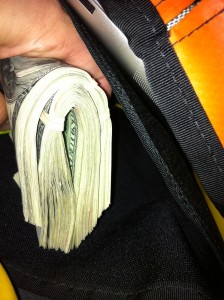
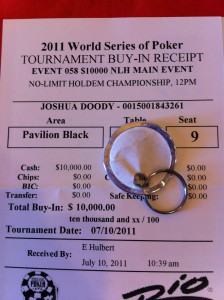
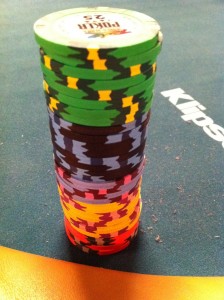
UPDATE: Sure enough, I made it through Day 1D with about average chips. We started the day with 30,000 chips and I finished the day with 50,025. I’m VERY satisfied with this result for a lot of reasons. I made a bad call during the first level and finished that hand with 23k (my low point so far). But I also had a VERY difficult table today, and managed to chip up despite my bad table. There were three well-known pros at my table for most of the day, and there were a couple other guys who I suspect were pros (probably online pros). All three of the initial known pros (Brandon Cantu, Adam Schoenfeld, John O’shea) ended up busting before the end of the day, and I managed to grow my stack to 60k at one point. Considering how soft the WSOP Main Event field is, this was a pretty unlucky table for Day 1.
I should say I also caught some hands today. I had Aces three times in one level (but only won three small pots, all pre-flop). I also had Kings a couple times and Queens a couple times. So, I did catch some cards, but they didn’t do me much good at my tough table. (Of course, I’ll take cards whenever I can get them.)
So, we start back Tuesday morning and I’ll have an average chip stack. My next goal is to make Day 3.
